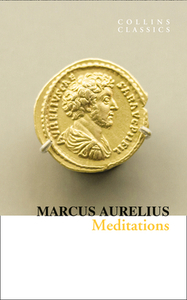Take a photo of a barcode or cover
inspiring
mysterious
reflective
medium-paced
emotional
reflective
slow-paced
challenging
hopeful
informative
inspiring
reflective
medium-paced
I got the advice to read it slowly. I would advise the future readers of this book the same. It is a book that needs to be understood fully. It took me two tries to finish this one. I had given up on this one a while back. I picked it up again as I do not like to keep my books DNF. It was a good decision.
First, let's get into the problems that I have with this book. I absolutely despised the language used for weak or unwanted character - use of the word 'womanish'. I get it, they were different times. Modern editions maybe can change the language. I also did not like Marcus waging wars himself but undermining the reasons behind other king's wars.
Now, the parts that I liked. It is amazing to think that this work was never meant to be published. These were Marcus' diary entries. He constantly tried to keep himself on the path of the righteousness. He kept repeating the things he wanted to implement in his life to himself through his writings. The advice that I loved the most from this collection is - It is not fit that I should give myself pain, for I have never intentionally given pain to another. What an absolutely marvellous thing to remind oneself.
The book keeps repeating some of the things but that is understandable. It shows consistency and never giving up attitude of Marcus to keep himself in check.
Anyone looking to read stoic philosophy and has a lot of patience to go through a book extremely slowly, should surely pick this one up! Happy reading.
First, let's get into the problems that I have with this book. I absolutely despised the language used for weak or unwanted character - use of the word 'womanish'. I get it, they were different times. Modern editions maybe can change the language. I also did not like Marcus waging wars himself but undermining the reasons behind other king's wars.
Now, the parts that I liked. It is amazing to think that this work was never meant to be published. These were Marcus' diary entries. He constantly tried to keep himself on the path of the righteousness. He kept repeating the things he wanted to implement in his life to himself through his writings. The advice that I loved the most from this collection is - It is not fit that I should give myself pain, for I have never intentionally given pain to another. What an absolutely marvellous thing to remind oneself.
The book keeps repeating some of the things but that is understandable. It shows consistency and never giving up attitude of Marcus to keep himself in check.
Anyone looking to read stoic philosophy and has a lot of patience to go through a book extremely slowly, should surely pick this one up! Happy reading.
informative
reflective
medium-paced
informative
inspiring
reflective
relaxing
slow-paced
challenging
inspiring
reflective
sad
slow-paced
does the sun try to do the rain’s work? or asclepius, demeter’s? and what about each of the stars— different, yet working in common?
no rating or judgement of the writing/topics, especially after finding out it was most likely his private journal. he felt alive when i read this, writing all this down, feels weird to close this book knowing that he’s actually long gone.
this is my first encounter with marcus aurelius, my first impression of him might be different than most. he held a lot of feelings, and for someone that got so fearful of the idea of death near the end of his life, he was truly trying to find his footing still as an emperor that was put in a hard situation with harsh responsibilities at way too young of an age. this caused him to be way harsher on himself and to me, distorted his idea of pleasure, yet still trying to be kind to the world.
it’s heartwarming to know he found his solace through writing and philosophy and his way of self-soothing, yet forever strange to know that these were meant to be his private thoughts.
how many people don’t even know your name. how many will soon have forgotten it.
even if i don’t necessarily agree with some of his views (and sadly that a lot of his ideals were adapted/skewed by podcast dudes), i got a bit emotional in parts.
since there are thoughts in this that i also consistently think of, the idea that people have been trying to make sense of reality for decades and centuries, even with totally different experiences? will get me.
beautiful things of any kind are beautiful in themselves and sufficient to themselves. is an emerald suddenly flawed if no one admires it?
not a stoic, nor do i relate to the philosophy, and i really think advertising this as philosophy is a disservice. it’s a piece of history that was almost lost to time.
“let him be only a man for once; for neither philosophy nor empire takes away natural feeling.” — antoninus pius
reflective
informative
inspiring
reflective
slow-paced
challenging
emotional
informative
reflective
slow-paced







